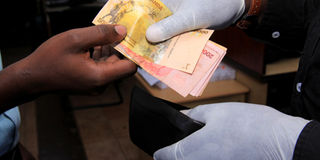There are greater values than money in life

In the monetised economies of the sort familiar to the World Bank, other values are thin on the ground. In African villages far from the line of road or rail, they are the main medium of exchange. Obligations exist between neighbouring households that are respected as reciprocal social duties in no need of organisational realisation.
Default is so rare in these communities that a network of mutual obligations sustains inter-household transactions. This practice is so deep in rural culture it makes any sort of banking or money lending rare. Inter-personal and inter-household debts are invariably redeemed in kind or by barter. The equivalent of liquidity is social status and reputation.
In some villages, the need for cash is minimal because trading is minimal. The village economy is based on self -reliance, and because households produce what they need from their own resource - food, clothing, shelter, they consume what they produce. This is a recognised practice of subsistence, denoted as OPC (own produce consumed), the opposite of globalisism.
In a study I took part in five years ago, the average cash needs among households in 12 Ugandan villages was a tiny fraction of their total livelihood value. The total could be estimated in money terms by reference to the market values in neighbouring communities, but the villagers appeared to need cash for only about 9 per cent of their total annual consumption.
Here is the original cashless economy based on cultural values, not on money. Is there a model here for modern economies now teetering on the edge of collapse?
Can the IMF expand digital exchange, transforming high risk debt into redeemable values? Some high-tech system of identity validation seems feasible, with inevitability loss of personal and corporate freedoms.
It is touching to read World Banker Joseph Stiglitz’s ‘Priorities for Covid 19 Economy’ (Daily Monitor, July 8) asserting ‘There is no economic reason why countries…can’t adopt large sustained recovery programmes that will affirm or move them closer to the societies they claim to be.’
What they claim to want, without altogether losing the convenience of money, are values that have no price: Social and racial justice, environmental care, productive skills, trust. African villages that enjoy social cohesion are scarcely a paradigm for human advance - their development is static, and they are vulnerable to external negatives.
In our study, I was interested mainly in the assets owned by Ugandan villagers -householders own very little, rarely more than 15 items, durable goods, including plastic kitchen bowls bought in or borrowed from distant markets, that augment locally-made wooden vessels. Such minimal demand is met by local supply, and it is effected by trust.
Here is nothing or very little of the Latent Demand typical of urban communities in the fifth to ninth decile of Ugandan income- receivers, comprising items they would love to buy if only they had money.
Uganda’s villages vary in population size and in their ratio of households to available resources water, soil fertility, nature, connectivity, all of which are fundamental to their scale of values, to their relationships, and to their potential for exportable production.
It is there that the human enemies of disease and ignorance have to be confronted, and their economic informality rendered accessible to developmental advance.




